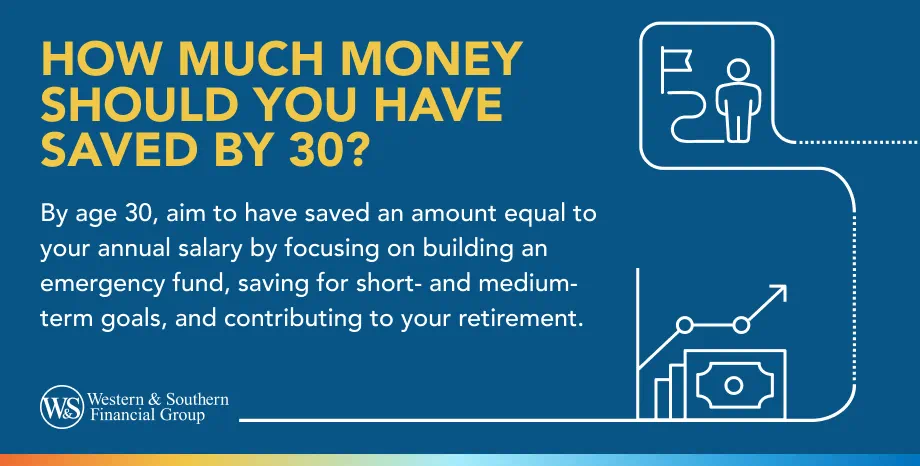

Table of Contents
Key Takeaways
- Aim to save an amount equal to your annual salary by age 30 to establish a solid foundation for savings.
- Contribute early and consistently to retirement accounts to maximize compounding returns over time.
- Create a budget and automate savings by using auto-deposits into investment accounts to avoid spending temptations.
- Seek guidance from a financial advisor to develop a personalized plan and build strong financial habits early.
- Maintain an emergency fund of 3-6 months' expenses in a liquid savings account for financial stability during crises.
Regular check-ups offer a great way to make sure you're prepared both for distant goals, such as retirement, as well as unexpected financial hurdles, such as losing employment. Milestone birthdays can be an excellent time for self-evaluation; the completion of your first decade in the workforce is no exception.
Of course, that raises the big question: How much money should you have saved by 30? When you break down your short- and long-term needs, it might be more than you think. But with careful financial planning in your 20s, staying on track is likely within your reach.
Your 3 Savings Buckets
Sound financial planning incorporates both your near-term needs and any obligations you may have further down the road. One helpful way to make sure you have your bases covered is by dividing your savings goals into three "buckets." These include:
- An emergency fund. Most people will want a contingency fund that can handle roughly three to six months' worth of expenses, providing a safety net if, for example, you should suddenly lose your job or face a major illness. An ideal place to keep those funds may be in an FDIC-insured savings account — or NCUA-backed account, for credit union customers — so you have easy access to them in an urgent scenario.
- Money for short- and medium-term goals. In addition to your rainy day fund, it's important to have money saved for short- or medium-term goals, such as a wedding or a down payment on a new home. While saving 20% or more of the property's value isn't always essential to making a purchase, it can help to prevent you from having to take out mortgage insurance, which can help to keep your monthly payments more manageable.
- Retirement money. While most young adults will remain in the workforce for decades, building a retirement fund now is absolutely critical. For a more customized analysis, our retirement savings calculator can help you determine whether your current contribution percentage will be enough to meet your projected needs as a retiree.
While everyone's circumstances vary, a good rule of thumb is to save an amount equal to your annual salary by 30th birthday. Those who are significantly behind that mark may have to increase their savings rate to catch up.
Investing Early Matters
Because of the effect of compound earnings, every dollar you put into a retirement account or other long-term savings vehicle now is likely to have greater value than what you kick in later in your career. That's why financial planning in your 20s, when most of your career is still ahead of you, is crucial when it comes to meeting your retirement needs.
Impact of Starting Late on Retirement Savings
While it's certainly possible to play catch up if you haven't started investing at age 30, waiting means you may have to kick in a higher percentage of your income down the road. Take, for example, a single 30-year-old who has already saved an amount equal to their annual salary of $60,000.
Invest 10% of income to reach $2 million by age 65, assuming 8% annual returns. But a 30-year-old making $60,000 a year who's just starting to invest? That individual will have to contribute more than 18% of their salary each year to accumulate the same amount by age 65.
Reaching Your Goals
For young adults working an entry-level job, just scraping together enough for the next rent payment or a used car can feel pretty harrowing. However, as you progress in your career and get closer to 30, it's all the more important to make sure you're prepared for future needs, whether anticipated or otherwise. Of course, adequately funding your three savings categories requires financial discipline.
Creating a Budget for Yourself
Whether you use an app or simply maintain a spreadsheet — can help to ensure that less of your money goes toward wants rather than needs.
Automating Your Savings
- For those who are behind on building an emergency fund, for instance, you may want to divert part of your paycheck to a savings account via direct deposit or a monthly bank draft.
- For those who have an employer-sponsored plan at work, putting your retirement account on auto-pilot is usually pretty easy. But even those without a 401(k)-style plan at work can still fund an IRA through a direct deposit or by scheduling electronic payments from your bank account. Since the money is going straight into your investment account, you'll avoid the temptation to spend it on things you may not need.
The Bottom Line
This may also be an opportune time to speak with a financial representative who can provide a personalized roadmap to help you meet your near- and long-term goals. By developing strong financial habits while you're young, you'll be far better equipped to handle financial challenges that arise later in your journey.












